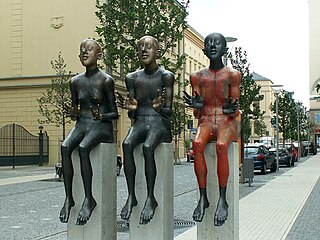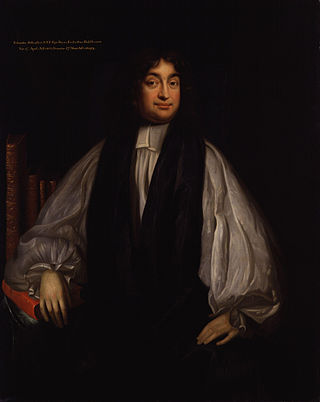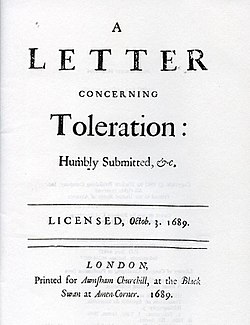
John Locke was an English philosopher and physician, widely regarded as one of the most influential of the Enlightenment thinkers and commonly known as the "father of liberalism". Considered one of the first of the British empiricists, following the tradition of Francis Bacon, Locke is equally important to social contract theory. His work greatly affected the development of epistemology and political philosophy. His writings influenced Voltaire and Jean-Jacques Rousseau, and many Scottish Enlightenment thinkers, as well as the American Revolutionaries. His contributions to classical republicanism and liberal theory are reflected in the United States Declaration of Independence. Internationally, Locke's political-legal principles continue to have a profound influence on the theory and practice of limited representative government and the protection of basic rights and freedoms under the rule of law.
Secularism is the principle of seeking to conduct human affairs based on naturalistic considerations, uninvolved with religion. It is most commonly thought of as the separation of religion from civil affairs and the state and may be broadened to a similar position seeking to remove or to minimize the role of religion in any public sphere. Secularism may encapsulate anti-clericalism, atheism, naturalism, non-sectarianism, neutrality on topics of religion, or antireligion. As a philosophy, secularism seeks to interpret life based on principles derived solely from the material world, without recourse to religion. It shifts the focus from religion towards "temporal" and material concerns.

Freedom of religion or religious liberty, also known as freedom of religion or belief (FoRB), is a principle that supports the freedom of an individual or community, in public or private, to manifest religion or belief in teaching, practice, worship, and observance. It also includes the right not to profess any religion or belief or "not to practise a religion".
The separation of church and state is a philosophical and jurisprudential concept for defining political distance in the relationship between religious organizations and the state. Conceptually, the term refers to the creation of a secular state and to disestablishment, the changing of an existing, formal relationship between the church and the state. The concept originated among early Baptists in America. In 1644, Roger Williams, a puritan minister and founder of the state of Rhode Island and The First Baptist Church in America, was the first public official to call for "a wall or hedge of separation" between "the wilderness of the world" and "the garden of the church." Although the concept is older, the exact phrase "separation of church and state" is derived from "wall of separation between Church & State," a term coined by Thomas Jefferson in his 1802 letter to members of the Danbury Baptist association in the state of Connecticut. The concept was promoted by Enlightenment philosophers such as John Locke.

Religious tolerance or religioustoleration may signify "no more than forbearance and the permission given by the adherents of a dominant religion for other religions to exist, even though the latter are looked on with disapproval as inferior, mistaken, or harmful". Historically, most incidents and writings pertaining to toleration involve the status of minority and dissenting viewpoints in relation to a dominant state religion. However, religion is also sociological, and the practice of toleration has always had a political aspect as well.

Toleration is when one allows or permits an action, idea, object, or person that they dislike or disagree with.

An edict of toleration is a declaration, made by a government or ruler, and states that members of a given religion will not suffer religious persecution for engaging in their traditions' practices. Edicts may imply tacit acceptance of a state religion.
The Declaration of Indulgence, also called Declaration for Liberty of Conscience, was a pair of proclamations made by James II of England and Ireland and VII of Scotland in 1687. The Indulgence was first issued for Scotland on 12 February and then for England on 4 April 1687. An early step towards establishing freedom of religion in Great Britain and Ireland, it was cut short by the Glorious Revolution.

Philipp van Limborch was a Dutch Remonstrant theologian.

Edward Stillingfleet was an English Christian theologian and scholar. Considered an outstanding preacher as well as a strong polemical writer defending Anglicanism, Stillingfleet was known as "the beauty of holiness" for his good looks in the pulpit, and was called by John Hough "the ablest man of his time".
A Christian republic is a government that is both Christian and republican.

The League of Militant Atheists, also Society of the Godless or Union of the Godless, was an atheistic and antireligious organization of workers and intelligentsia that developed in Soviet Russia under influence of the ideological and cultural views and policies of the Communist Party of the Soviet Union from 1925 to 1947. It consisted of party members, members of the Komsomol youth movement, those without specific political affiliation, workers, and military veterans.
Criticism of atheism is criticism of the concepts, validity, or impact of atheism, including associated political and social implications. Criticisms include positions based on the history of science, philosophical and logical criticisms, findings in both the natural and social sciences, theistic apologetic arguments, arguments pertaining to ethics and morality, the effects of atheism on the individual, or the assumptions that underpin atheism.

Atheism, agnosticism, scepticism, freethought, secular humanism or general irreligion are increasing in Australia. Post-war Australia has become a highly secularised country. Religion does not play a major role in the lives of much of the population.
Jonas Proast (c.1640−1710) was an English High Church Anglican clergyman and academic. He was an opponent of latitudinarianism, associated with Henry Dodwell, George Hickes, Thomas Hearne and John Edwards. He is now known for his controversy with John Locke, over Locke's Letter concerning Toleration.

Atheism, as defined by the entry in Diderot and d'Alembert's Encyclopédie, is "the opinion of those who deny the existence of a God in the world. The simple ignorance of God doesn't constitute atheism. To be charged with the odious title of atheism one must have the notion of God and reject it." In the period of the Enlightenment, avowed and open atheism was made possible by the advance of religious toleration, but was also far from encouraged.

The Toleration Act 1688, also referred to as the Act of Toleration or the Toleration Act 1689, was an Act of the Parliament of England. Passed in the aftermath of the Glorious Revolution, it received royal assent on 24 May 1689.
The Great Tew Circle was a group of clerics and literary figures who gathered in the 1630s at the manor house of Great Tew, Oxfordshire in southern England, and in London.
John Marshall is a British historian. He was the Chairman of the Department of History at Johns Hopkins University, and is now Leonard and Helen R. Stulman Professor of History at the same institution.
Mark Goldie is an English historian and Professor of Intellectual History at Churchill College, Cambridge. He has written on the English political theorist John Locke and is a member of the Early Modern History and Political Thought and Intellectual History subject groups at the Faculty of History in Cambridge.











